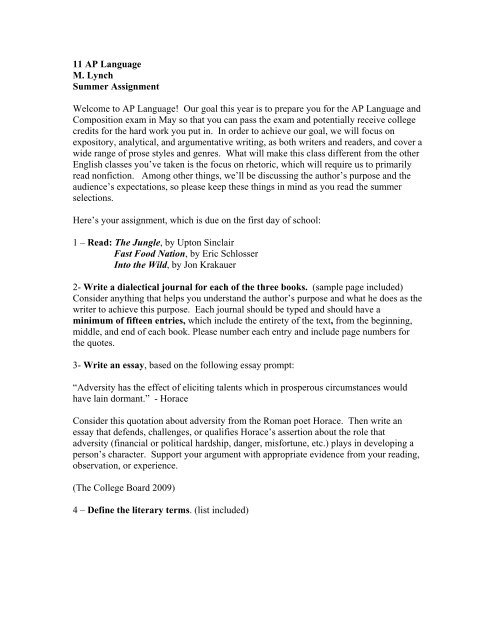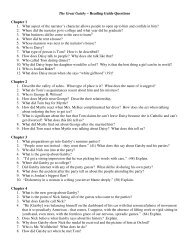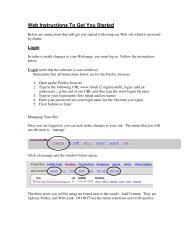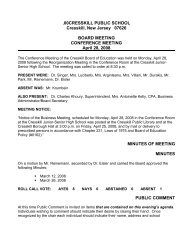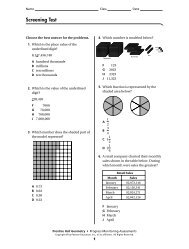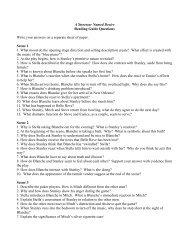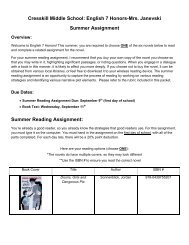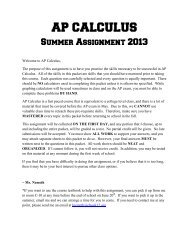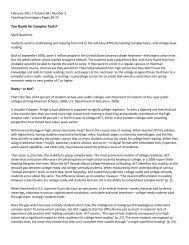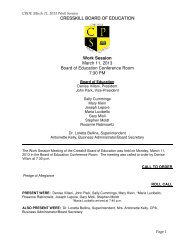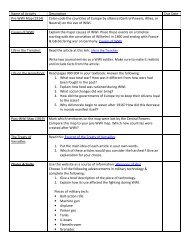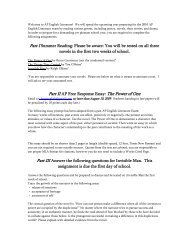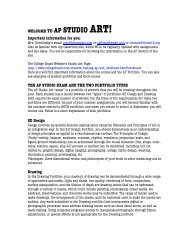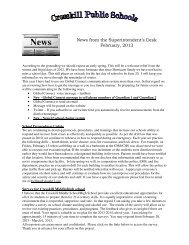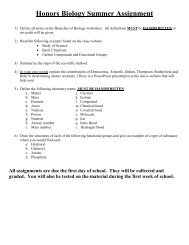AP English Language summer reading - Lynch (pdf)
AP English Language summer reading - Lynch (pdf)
AP English Language summer reading - Lynch (pdf)
Create successful ePaper yourself
Turn your PDF publications into a flip-book with our unique Google optimized e-Paper software.
11 <strong>AP</strong> <strong>Language</strong><br />
M. <strong>Lynch</strong><br />
Summer Assignment<br />
Welcome to <strong>AP</strong> <strong>Language</strong>! Our goal this year is to prepare you for the <strong>AP</strong> <strong>Language</strong> and<br />
Composition exam in May so that you can pass the exam and potentially receive college<br />
credits for the hard work you put in. In order to achieve our goal, we will focus on<br />
expository, analytical, and argumentative writing, as both writers and readers, and cover a<br />
wide range of prose styles and genres. What will make this class different from the other<br />
<strong>English</strong> classes you’ve taken is the focus on rhetoric, which will require us to primarily<br />
read nonfiction. Among other things, we’ll be discussing the author’s purpose and the<br />
audience’s expectations, so please keep these things in mind as you read the <strong>summer</strong><br />
selections.<br />
Here’s your assignment, which is due on the first day of school:<br />
1 – Read: The Jungle, by Upton Sinclair<br />
Fast Food Nation, by Eric Schlosser<br />
Into the Wild, by Jon Krakauer<br />
2- Write a dialectical journal for each of the three books. (sample page included)<br />
Consider anything that helps you understand the author’s purpose and what he does as the<br />
writer to achieve this purpose. Each journal should be typed and should have a<br />
minimum of fifteen entries, which include the entirety of the text, from the beginning,<br />
middle, and end of each book. Please number each entry and include page numbers for<br />
the quotes.<br />
3- Write an essay, based on the following essay prompt:<br />
“Adversity has the effect of eliciting talents which in prosperous circumstances would<br />
have lain dormant.” - Horace<br />
Consider this quotation about adversity from the Roman poet Horace. Then write an<br />
essay that defends, challenges, or qualifies Horace’s assertion about the role that<br />
adversity (financial or political hardship, danger, misfortune, etc.) plays in developing a<br />
person’s character. Support your argument with appropriate evidence from your <strong>reading</strong>,<br />
observation, or experience.<br />
(The College Board 2009)<br />
4 – Define the literary terms. (list included)
Students are advised to buy their own copies of the books so that they can mark up<br />
passages; taking notes and highlighting are highly recommended. The three dialectical<br />
journals are due on the first day of school, and the <strong>summer</strong> <strong>reading</strong>s will be the basis for<br />
our discussions and writing assignments for the first month of school. Announced tests<br />
on the three books may be given once we’re back at school.<br />
Plagiarism:<br />
“Plagiarism refers to a form of cheating that has been defined as ‘the false assumptions of<br />
authorship; the wrongful act of taking the product of another person’s mind, and<br />
presenting it as one’s own. To use another person’s ideas pr expressions in your writing<br />
without acknowledging the source is to plagiarize. Plagiarism, then, constitutes<br />
intellectual theft.’” (MLA Handbook for Writers of Research Papers, Fifth Edition, pg.<br />
30). Any plagiarized paper will receive a failing grade of zero.<br />
I hope you like the three <strong>reading</strong> selections that have been chosen. We will pair up<br />
Into the Wild with some transcendental writing that you might be familiar with from<br />
your American Lit. class, and we’ll discuss Fast Food Nation along with The Jungle.<br />
I know our tendency seems to be to leave these kinds of assignments until the very<br />
last second, but I think that you’ll get more out of them if you can start them earlier<br />
and not feel too rushed when <strong>reading</strong>.<br />
Have a great <strong>summer</strong>!<br />
I’m looking forward to next year-<br />
Ms. <strong>Lynch</strong>
Literary Terms<br />
Using this list, create a dictionary for yourself by defining each of the following words.<br />
You’ll use this for reference throughout the year, and we’ll also be adding to it. I<br />
recommend that you type the definitions. You’ll be using these terms in essays<br />
throughout the year, and quizzes will be given intermittently. (Due the first day of<br />
school, September 2nd)<br />
1. abstract 39. jargon<br />
2. allegory 40. logical appeal/logos<br />
3. anecdote 41. lyrical<br />
4. annotation 42. mode<br />
5. antithesis 43. mood<br />
6. aphorism 44. narration<br />
7. apostrophe 45. objectivity<br />
8. argumentation 46. oversimplification<br />
9. cacophony/dissonance 47. oxymoron<br />
10. caricature 48. pacing<br />
11. colloquialism 59. parable<br />
12. coherence/unity 60. paradox<br />
13. concrete language 61. parallelism<br />
14. connotation 62. parody<br />
15. consonance 63. pathetic appeal/pathos<br />
16. conundrum 64. pedantic<br />
17. deduction 65. persuasion<br />
18. denotation 66. regionalism<br />
19. description 67. repetition<br />
20. diction 68. rhetorical modes<br />
21. didactic 69. rhetorical question<br />
22. discourse 70. sarcasm<br />
23. emotional appeal/pathos 71. satire<br />
24. epigraph 72. speaker<br />
25. ethical appeal/ethos 73. stereotype<br />
26. euphemism 74. style<br />
27. euphony 75. style<br />
28. example 76. subjectivity<br />
29. explication 77. syllogism<br />
30. exposition 78. synecdoche<br />
31. generalization 79. syntactic fluency<br />
32. genre 80. syntactic permutation<br />
33. humor 81. syntax<br />
34. hyperbole 82. theme<br />
35. image 83. thesis<br />
36. induction 84. tone<br />
37. inference 85. transition<br />
38. inversion 86. understatement 87. voice


